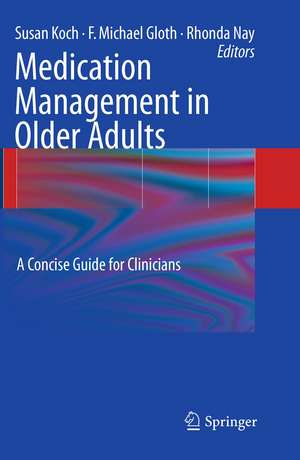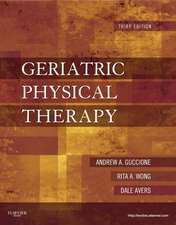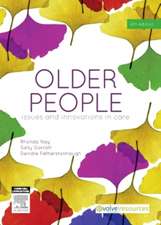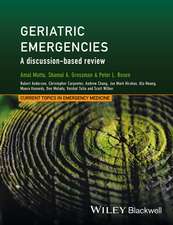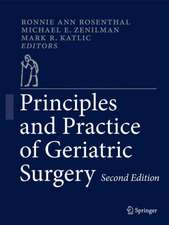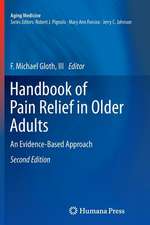Medication Management in Older Adults: A Concise Guide for Clinicians
Editat de Susan Koch, F. Michael Gloth, Rhonda Nayen Limba Engleză Paperback – 8 sep 2010
Preț: 360.86 lei
Preț vechi: 379.86 lei
-5% Nou
Puncte Express: 541
Preț estimativ în valută:
69.05€ • 72.29$ • 57.13£
69.05€ • 72.29$ • 57.13£
Carte tipărită la comandă
Livrare economică 05-19 aprilie
Preluare comenzi: 021 569.72.76
Specificații
ISBN-13: 9781603274562
ISBN-10: 1603274561
Pagini: 152
Ilustrații: X, 188 p. 4 illus.
Dimensiuni: 155 x 235 x 15 mm
Greutate: 0.22 kg
Ediția:2010
Editura: Springer
Colecția Springer
Locul publicării:New York, NY, United States
ISBN-10: 1603274561
Pagini: 152
Ilustrații: X, 188 p. 4 illus.
Dimensiuni: 155 x 235 x 15 mm
Greutate: 0.22 kg
Ediția:2010
Editura: Springer
Colecția Springer
Locul publicării:New York, NY, United States
Public țintă
Professional/practitionerCuprins
Is There a Problem? The Evidence of Types and Causes of Medication Errors by Healthcare Workers.- Quality Use of Medicines: Policy and Practice.- The Ethics of Prescribing Medications to Older People.- Common Medication Errors in the Acute Care Sector.- Common Medication Errors in Long-Term Care Settings.- The Impact of Medication on Nutritional Status of Older People.- Medication Management in Older Adults: What a Systematic Review Tells Us.- Misuse of Formulations in the Aged Care Setting.- Electronic Health Records, Medications, and Long-Term Care.- Computerized Order Entry.- Inappropriate Prescribing: Beers Criteria, Polypharmacy, and Drug Burden.- Dosing Errors: Age-Related Changes in Pharmacokinetics.
Recenzii
From the reviews:
“This is a multiauthored guide, mostly by Australian authors, to medications for older adults. … The audience here is broad - - pharmacists nurses, prescribers, and policy makers. The authors bring a wide range of knowledge to bear on the subject. … There are a number of tables describing errors in giving medications to older persons and what to do about them. There is a useful diagram of adverse drug actions in older persons. This book discusses these things philosophically … .” (David O. Staats, Doody’s Review Service, January, 2011)
“This is a multiauthored guide, mostly by Australian authors, to medications for older adults. … The audience here is broad - - pharmacists nurses, prescribers, and policy makers. The authors bring a wide range of knowledge to bear on the subject. … There are a number of tables describing errors in giving medications to older persons and what to do about them. There is a useful diagram of adverse drug actions in older persons. This book discusses these things philosophically … .” (David O. Staats, Doody’s Review Service, January, 2011)
Textul de pe ultima copertă
Medication use is the predominant form of health intervention in our society. And as we age, the likelihood of medication use increases dramatically, with more than 80 percent of those over age 65 using one or more medications. Along with that, the potential for medication errors also increases. Indeed adverse drug reactions (ADRs) and adverse drug events (ADEs) are a significant problem in older adults. Written in a practical format by contributors from Australia and the United States, Medication Management in Older Adults: A Concise Guide for Clinicians presents the available evidence on research interventions designed to reduce the incidence of medication errors in older adults, with a focus on acute, subacute, and residential (long-term) care settings. Because medication errors can occur at all stages in the medication process, from prescription by physicians to delivery of medication to the patient by nurses, and in any site in the health system, it is essential that interventions be targeted at all aspects of medication delivery. Chapters cover the principles of medical ethics in relation to medication management; common medication errors in the acute care sector; medication management in long-term care settings; nutrition and medications; the outcomes of a systematic review; dose form alterations; Electronic Health Records (EHR), Computerized Order Entry (COE), Beers criteria; and pharmacokinetics and pharmacodynamics. For those clinicians especially concerned with providing the best possible outcomes for their older adult patients, Medication Management in Older Adults: A Concise Guide for Clinicians is an invaluable resource and a significant contribution to the burgeoning literature on medication errors.
Caracteristici
Concise, easy-to-read overview of medication management in older adults
